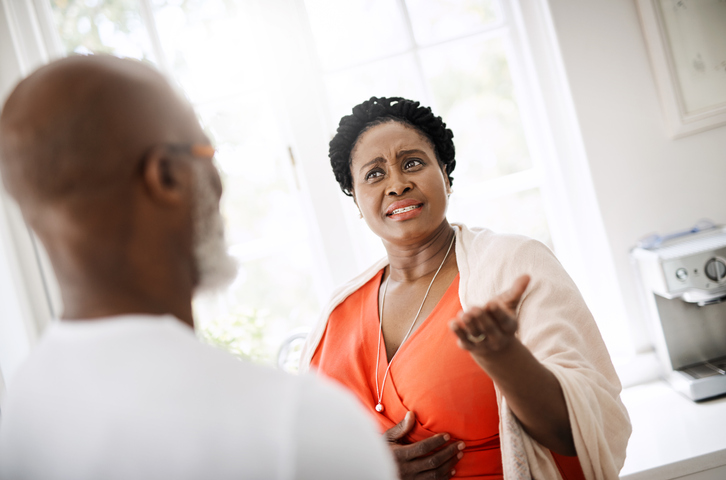
Source: Cecilie_Arcurs / Getty
Years ago, my family all met in Fort Wayne, Indiana for a family reunion. During the myriad of activities that took place that year, the schedule also included a visit to the cemetery to pay our respects to some of our ancestors.
While we were walking through, we spotted the headstone of my great-uncle by marriage—the husband to my grandmother’s sister. Next to his name, the date of his birth and death, there was the name of my great aunt. But there were no dates next to her name because she was very much alive.
So alive that she had remarried a man she met from church.
We stood there looking at the gravestone and eyebrows raised, a couple of whispers were passed. Since she had remarried, where would she be buried? With her first husband, the father of her children or the second one—the new love that had come into her life late.
My great-aunt married at least once more since then. Her second husband died. And maybe her third too. I stopped keeping track. Late last year, she passed. And because of COVID, I don’t know where she’s buried actually.
It wasn’t something I really thought about again until a tweet from a friend brought this all back to memory.
She was listening to a podcast from 2019, Modern Love. In it, Marsai Tomei, reads an essay written by Judith Newman, He’s Going Back To His Former Wife…Sort Of. The essay and podcast describe how a man, on his deathbed, told his wife that he’d made a promise to be buried with his first wife, a woman who had died 30 years ago.
The first wife had been cremated and the husband carried her ashes around with him for years, even after he remarried and had children. It wasn’t until he was dying, afflicted with three different types of cancer all at once, that he told his second wife that the plan was that his ashes were to be buried along with the ashes of his second wife at a field in England they both frequented. And since the field wasn’t what it used to be, he’d need his second wife, their sons and his 90-year old sister to do the deed at night, with flashlights because it was probably illegal.
In the podcast, the second wife shares how the request caught her off guard. Sensing her hesitation, the husband suggested that wife number 2 could hold on to both sets of ashes and then have their sons bury all three of them together in that English field.
But eventually, she got over the trepidation and honored her husband’s request. After all, one of the things she cherished most about her husband was his ability to keep his promises and to love deeply.
I found the story fascinating.
The whole thing speaks to the love the husband had for his wife and the love the second wife had for her husband to honor his wishes but also his first marriage.
Naturally, the whole thing made me wonder what I would do in this scenario. Then again, my perceptions and attitudes about death are a little more…lax than most people. I’ve always thought and even said that aside from outright desecration and disrespect, I don’t care what happens to my physical body once I’m out of here. I want my remains to be used to plant a tree. I want my friends and family to have a celebration of life and that’s about it. I’ve always found caskets and plots to be an exorbitant waste of money when I literally won’t be there. I’m very clear about my personhood not residing in my physical body. So with all of that being said, I don’t feel strongly about being buried anywhere specific and not even next to anyone.
But if it were important to someone else—even my husband and his first wife, I think I would be big enough to let them have that. And then we can all kiki and chat it up on the other side when I get there. I don’t own my husband and I don’t have to be physically next to them, in a body I no longer inhabit to show those left behind that we shared a connection. We know what it is/was. And hopefully, the people we loved understand that as well. I think we should all examine how much control we feel we have over our partners, their agency, and their choices, even in death.
I don’t know if there’s a right or wrong way to go about this. Death and the memorialization of a loved one hold varying degrees of significance for different people. And if you know final resting places are important to you, as morbid as it may be for some, this is a conversation you might want to have before you’re on your deathbed.
If your partner asked to be buried next to someone else, their first spouse, parents etc., how would you feel about it? Would you honor their wishes?
Veronica Wells-Puoane is the culture editor at MadameNoire.com. She is the author of “Bettah Days” and You’ll Be All Write, a question and answer journal for Black women. She is also the creator of NoSugarNoCreamMag, a website dedicated to sharing Black women’s authentic stories..









